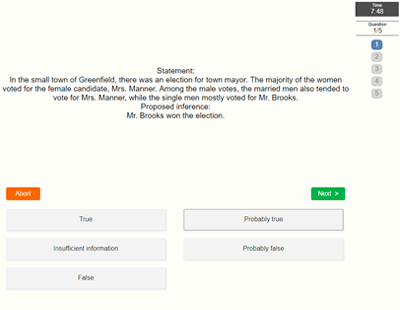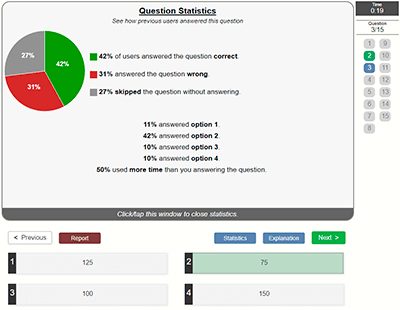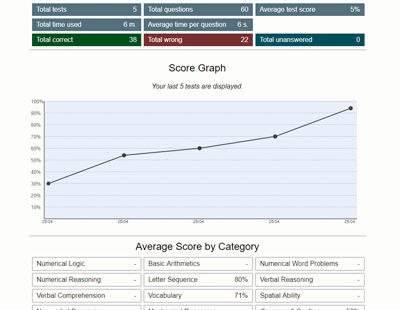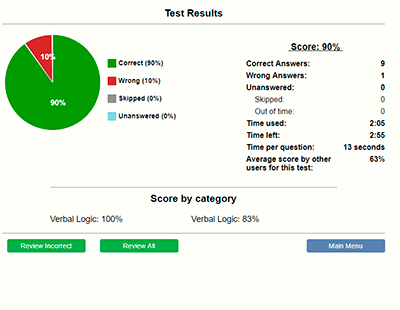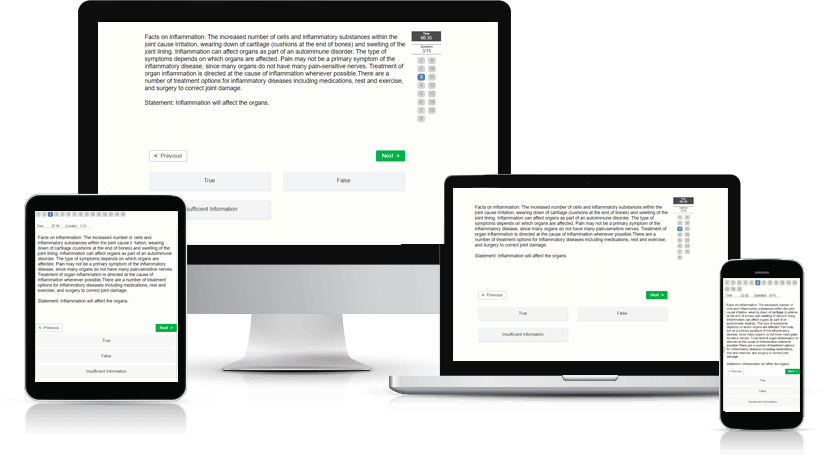Deductive Reasoning Test
Deductive reasoning questions will require you to use your problem-solving and reasoning skills, by evaluating arguments, analyzing scenarios, and drawing logical conclusions.
What is Deductive Reasoning?
Deductive reasoning is the process of reasoning from one or more statements to reach a logically certain conclusion.
How is it different from Inductive Reasoning?
While deductive reasoning implies logical certainty, inductive reasoning only gives you reasonable probability.
In deductive reasoning a specific conclusion is drawn based on rules or general principles.
In inductive reasoning a specific given example or a set of repetitive occurrences lead to a rule or pattern.
What kind of questions can I expect?
In deductive reasoning questions you must draw conclusions based on only the information given in the question and not your own knowledge. If the conclusion cannot be drawn from the information given, then the conclusion does not follow.
There are several types of questions that evaluate deductive reasoning ability.
Syllogisms:
The most common types of deductive reasoning questions are syllogisms. A syllogism is a type of logical argument in which a pair of sentences serve as the rules/premises and a third sentence serves as the conclusion.
Example:
All crows are black.
All black birds are loud. All crows are birds.
Statement: All crows are loud.
A: True
B: False
C: Insufficient information
The correct answer is “true.”
Deductive reasoning questions are rarely that simple and the premises given can also be given less directly, as through a text paragraph.
Arrangements:
Another very common form of deductive reasoning question is arrangements. In arrangements you are given information about the order of items or people in comparison to one another. You are required to mentally arrange the items/people according to the information given and answer a question based on the arrangement.
Example:
Mike finished ahead of Paul. Paul and Brian both finished before Liam. Owen did not finish last.
Who was the last to finish?
A: Owen
B: Brian
C: Paul
D: Liam
The correct answer is: Liam
The order:
Mike finished before Paul, so Mike was not last. Paul and Brian finished before Liam, so Paul and Brian were not last. It is stated that Owen did not finish last. Only Liam remains, so Liam must have been last to finish.
Where are Deductive reasoning tests used?
Deductive reasoning tests are used as part of assessing candidates applying to entry and midlevel positions requiring deductive reasoning ability.
A deductive reasoning test may be part of your assessment if you are applying for jobs within science and IT, such as technical design, engineering, and software development.

Practice Deductive Reasoning Test
Try a free Deductive Reasoning Test.
This practice Deductive Reasoning test contains 10 test questions and has a time limit of 7 minutes.
Would you like to improve your test score? Practice smart with a Test Prep Account.
Practice on 130 deductive reasoning questions and a total of 950 verbal aptitude questions with detailed description and score statistics.
The many features of a Test Prep Account:
- Preparation software developed under a didactic and methodical perspective
- High-quality practice test questions
- Clearly explained solutions
- Accessible on all devices
- Detailed score data and progression charts
- Reference scores to compare your performance against others
- Training Assistant
- Practice mode (feedback after every question and no time limit)
